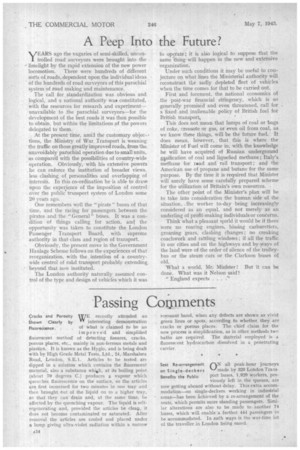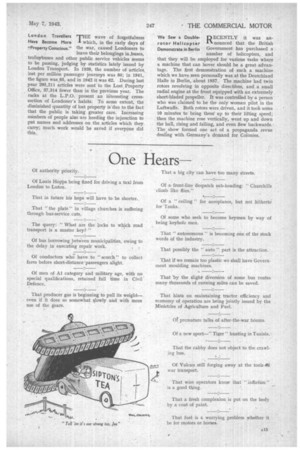Passing CoMments
Page 16

Page 17

If you've noticed an error in this article please click here to report it so we can fix it.
WE recently attended an interesting demonstration of what is claimed to be an improv e'd and simplified of detecting fissures, cracks, porous places, etc., mainly in non.-ferrous metals and plastics. It is known as the Hyglo, and is being dealt with by High Grade Metal Tests, Ltd., 24,Marshalsea Road, London, SE.]. Articles to be tested are dipped in a solution which contains the fluorescent material, also a substance whiih, at its boiling point (about 70 degrees C.) produces a vapour which quenches fluorescence on the surface, so the articles are, first immerser] for two minutes in one tray and then brought out of the liquid on to a higher tray, sO that they can' drain and, at the same time. be affected by the quenching vapour. The liquid is selfregenerating and, provided the articles be cleap, it does not become contaminated or saturated. After removal the articles are cooled and placed under a lamp giving ultra-violet radiation within a narrow
Cracks and Porosity Shown Clearly by Fluorescence. . . .
fluorescent method'
resonant band, when any defects are shown as vivid green lines or spots.according to whether they are cracks or porous places. The chief claim for the new process is simplification, as in other Methods two baths are required. The Material employed is a fluorescent hydrocarbon dissolved in a penetrating carrier.
Seat Re-arrangement dry all peak-hour journeys on Single-deckers •—•made by 320 London Trans.
Benefits the Public port buses, 1,920 workers, pre viously left in the queues, are now getting aboard without delay. This'extra accommodation—on single-deckers working in industrial areas—has been achieved by a re-arrangement of the seats, which permits more Standing passengers. Similar alterations are also to be made to 'another 74 buses, which will enable a further 444 passengers in be accommodated. In sixth ways is the war-time lot of the traveller in London being eased. London Travellers THE wave of forgetfulness Have Become More A which, in the early days of "Property Conscious." the war, caused Londoners to leave their belongings in .buses, trolleybuses and other public service vehicles seems to be passing, judging by statistics lately issued by London Transport. In 1938, the number of articles. lost per millin passenger journeys was 86; in 1941, the figure was 85, and in 1942 it was 62. During last year 205,211 articles were sent to the Lost Property Office, 37,314 fewer than in the previous year. The racks at the L.P.O. present an interesting crosssection of Londoner's habits. To some extent, the diminished quantity of lost property is due to the fact that the public is taking greater care. Increasing numbers of people also are heeding the injunction to put names and addresses on the articles which they carry; Much work would be saved if everyone did this. We Saw a DoubleDECENTLY it was an rotor Helicopter nounced that the British Demonstrate in Berlin Government has purchased a number of helicopters, and that they will be employed for various tasks where a machine that can hover should be a great advantage. The first demonstration of such a machine which we have seen personally was at the Deutchland Halle in Berlin, about 1937. The machine had twin rotors revolving in opposite directions, and a small radial engine at the front equipped with an extremely short-bladed propeller. It was controlled by a person who was claimed to be the only woman pilot in the Luftwaffe. Both rotors were driven, and it took some 10 minutes to bring them' up to their lifting speed; then the machine rose vertically, went up and down the hall, rising and falling, and even flew backwards.. The.show formed one act of a propaganda revue dealing with Germany's demand for Colonies.




















































